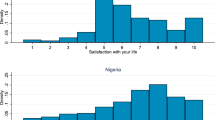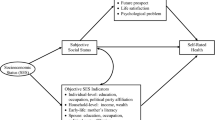Abstract
Socioeconomic status (SES) and income inequality are now recognized as important determinants of health, and there is growing interest in uncovering the intermediary psychosocial pathways through which the socioeconomic context affects physical well-being (Marmot in The status syndrome: how social standing affects our health and longevity, Henry Holt, New York, 2004; Wilkinson and Pickett in The Spirit Level: why more equal societies almost always do better, Allen Lane, London, 2009). We adopted the applied framework of self-determination theory (SDT; Deci and Ryan in Psychol Inq 11:227–268, 2000) and hypothesized that fulfillment of the basic psychological needs for autonomy, competence, and relatedness would mediate the relationships that SES and income inequality have to self-rated health. An online community sample of American participants (N = 1,139) completed a detailed demographic survey and provided self-reports of need fulfillment and health complaints. Structural equation models controlled for impression management and self-deceptive enhancement. Controlling for sex and age, need fulfillment was predicted positively by subjective SES and objective household income and negatively by state-level income inequality; in turn, need fulfillment predicted lower levels of health complaints. These findings suggest that SDT provides a useful framework for the study of SES, income inequality, and health, and that basic psychological needs are an important mechanism through which socioeconomic contexts influence health.

Similar content being viewed by others
Notes
In this regard, it is worth noting that the SMUHQ contains items for common health symptoms and minor illnesses as well as items for more serious and chronic health problems. In the Supplemental Materials we consider a more nuanced set of analyses using participants’ responses on this instrument. These ancillary analyses are detailed in the Supplemental Materials, pp. 6–13. The results of these ancillary analyses do not substantively differ from those obtained from our main models.
References
Adler, N. E., Epel, E. S., Castellazzo, G., & Ickovics, J. R. (2000). Relationship of subjective and objective social status with psychological and physiological functioning: Preliminary data in healthy White women. Healthy Psychology, 19, 586–592. doi:10.1037//0278-6133.19.6.386.
Adler, N. E., & Ostrove, J. M. (1999). Socioeconomic status and health: What we know and what we don’t. In N. E. Adler, M. G. Marmot, B. S. McEwen, & J. Stewart (Eds.), Annals of New York Academy of Sciences, Vol. 896: Socioeconomic status and health in industrial nations: Social, psychological, and biological pathways (pp. 3–15). New York: The New York Academy of Sciences.
Adler, N. E., & Snibbe, A. C. (2003). The role of psychosocial processes in explaining the gradient between socioeconomic status and health. Current Directions in Psychological Science, 12, 119–123. doi:10.1111/1467-8721.01245.
Bartholomew, K. J., Ntoumanis, N., Ryan, R. M., Bosch, J. A., & Thøgersen-Ntoumani, C. (2011). Self-determination theory and diminished functioning: The role of interpersonal control and psychological need thwarting. Personality and Social Psychology Bulletin, 37, 1459–1473. doi:10.117/0146167211413125.
Buhrmester, M., Kwang, T., & Gosling, S. D. (2011). Amazon’s mechanical turk: A new source of inexpensive, yet high-quality, data? Perspectives on Psychological Science, 3, 3–5. doi:10.1177/17456916.
Charlesworth, S. J., Gilfillan, P., & Wilkinson, R. (2004). Living inferiority. British Medical Bulletin, 69, 49–60. doi:10.1093/bmb/Idh003.
Chirkov, V. I., Ryan, R. M., & Sheldon, K. M. (2011). Human autonomy in cross-cultural context: Perspectives on the psychology of agency, freedom, and well-being. Dordrecht: Springer.
de Vries, R., Gosling, S., & Potter, J. (2011). Income inequality and personality: Are less equal U.S. states less agreeable? Social Science and Medicine, 72, 1978–1985. doi:10.1016/j.socscimed.2011.03.046.
Deci, E. L., & Ryan, R. M. (2000). The “what” and “why” of goal pursuits: Human needs and the self-determination of behavior. Psychological Inquiry, 11, 227–268. doi:10.1207/S15327965PLI1104_01.
Diener, E., Ng, W., Harter, J., & Arora, R. (2010). Wealth and happiness across the world: Material prosperity predicts life evaluation, whereas psychosocial prosperity predicts positive feeling. Journal of Personality and Social Psychology, 99, 52–61. doi:10.1037/a0018066.
Fox, J. (2006). Structural equation modeling with the sem package in R. Structural Equation Modeling, 13, 465–486. doi:10.1207/s15328007sem1303_7.
Fuller-Rowell, T. E., Evans, G. W., & Ong, A. D. (2012). Poverty and health: The mediating role of perceived discrimination. Psychological Science, 23, 734–739. doi:10.1177/0956797612439720.
Gagné, M. (2003). The role of autonomy support and autonomy orientation in prosocial behavior engagement. Motivation and Emotion, 27, 199–223. doi:10.1023/A:1025007614869.
Gagné, M., & Bhave, D. (2011). Autonomy in the workplace: An essential ingredient to employee engagement and well-being in every culture. In V. I. Chirkov, R. M. Ryan, & K. M. Sheldon (Eds.), Human autonomy in cross-cultural context: Perspectives on the psychology of agency, freedom, and well-being (pp. 163–187). Dordrecht: Springer.
Gagné, M., & Deci, E. L. (2005). Self-determination theory and work motivation. Journal of Organizational Behavior, 26, 331–362. doi:10.1002/job.322.
Gallo, L. C., & Matthews, K. A. (2003). Understanding the association between socioeconomic status and physical health: Do negative emotions play a role? Psychological Bulletin, 129, 10–151. doi:10.1037/0033-2909.129.1.10.
Goldman, D. P., & Smith, J. P. (2002). Can patient self-management help explain the SES health gradient? In Proceedings of the National Academy of Sciences, USA (Vol. 99, pp. 10929–10934). doi:10.1073/pnas.162086599.
Idler, E. L., & Benyamini, Y. (1997). Self-rated health and mortality: A review of twenty-seven community studies. Journal of Health and Social Behavior, 38(1), 21–37.
Kasser, T. (2011). Capitalism and autonomy. In V. I. Chirkov, R. M. Ryan, & K. M. Sheldon (Eds.), Human autonomy in cross-cultural context: Perspectives on the psychology of agency, freedom, and well-being (pp. 191–207). Dordrecht: Springer.
Kline, R. (2011). Principles and practice of structural equation modeling. New York: The Guilford Press.
Lachman, M. E., & Weaver, S. L. (1998). The sense of control as a moderator of social class differences in health and well-being. Journal of Personality and Social Psychology, 74, 763–773. doi:10.1037/0022-3514.74.3.763.
Loughnan, S., Kuppens, P., Allik, J., Balazs, K., de Lemus, S., Dumont, K., et al. (2012). Economic inequality is linked to biased self-perception. Psychological Science, 22, 1254–1258. doi:10.1177/0956797611417003.
Magee, J. C., & Galinsky, A. D. (2008). Social hierarchy: The self-reinforcing nature of power and status. The Academy of Management Annals, 2, 351–398. doi:10.1080/19416520802211628.
Marmot, M. G. (2004). The status syndrome: How social standing affects our health and longevity. New York, NY: Henry Holt.
Marmot, M. G. (2006). Status syndrome: A challenge to medicine. Journal of the American Medical Association, 295, 1304–1307. doi:10.1001/jama.295.11.1304.
Ng, J. Y. Y., Ntoumanis, N., Thøgersen-Ntoumani, C., Deci, E. L., Ryan, R. M., Duda, J. L., et al. (2012). Self-determination theory applied to health contexts: A meta-analysis. Perspectives in Psychological Science, 7, 325–340. doi:10.1177/1745691612447309.
Noss, A. (2011). Household income for states: 2009 and 2010: American community survey briefs. U.S. Department of Commerce, Economics and Statistics Administration. U.S. Census Bureau.
Oishi, S., Kesebir, S., & Diener, E. (2011). Income inequality and happiness. Psychological Science, 22, 1095–1100. doi:10.1177/0956797611417262.
Paulhus, D. L. (1991). Measurement and control of response bias. In J. P. Robinson, P. R. Shaver, & L. S. Wrightsman (Eds.), Measures of personality and social psychological attitudes (pp. 17–59). New York: Academic Press.
Pennebaker, J. W. (1982). The psychology of physical symptoms. New York: Springer-Verlag.
Prottas, D. (2008). Do the self-employed value autonomy more than employees? Research across four samples. The Career Development International, 13, 33–45. doi:10.1108/-13620430810849524.
Quested, E., Bosch, J. A., Burns, V. E., Cuming, J., Ntoumanis, N., & Duda, J. L. (2011). Basic psychological need satisfaction, stress-related appraisals, and dancers’ cortisol and anxiety responses. Journal of Sport and Exercise Psychology, 2011(33), 828–846.
Reeve, J., & Tseng, C. M. (2011). Cortisol reactivity to a teacher’s motivating style: The biology of being controlled versus supporting autonomy. Motivation and Emotion, 25, 63–74. doi:10.1007/s11031-011-9204-2.
Reis, H. T., Sheldon, K. M., Gable, S. L., Roscoe, J., & Ryan, R. M. (2000). Daily well-being: The role of autonomy, competence, and relatedness. Personality and Social Psychology Bulletin, 26, 419–435. doi:10.1177/0146167200266002.
Ryan, R. M. (1995). Psychological needs and the facilitation of integrative processes. Journal of Personality, 63, 397–427. doi:10.1111/j.1467-6494.1995.tb00501.x.
Ryan, R. M., Bernstein, J. H., & Brown, K. W. (2010). Weekends, work, and well-being: Psychological need satisfactions and day of the week effects on mood, vitality, and physical symptoms. Journal of Social and Clinical Psychology, 29, 95–122. doi:10.1521/jscp.2010.29.1.95.
Ryan, R. M., & Deci, E. L. (2006). Self-regulation and the problem of human autonomy: Does psychology need choice, self-determination, and will? Journal of Personality, 74, 1557–1585. doi:10.1111/j.1467-6494.2006.00420.x.
Ryff, C. D., & Singer, B. H. (2008). Know thyself and become what you are: A eudaimonic approach to psychological well-being. Journal of Happiness Studies, 9, 13–39. doi:10.1007/s10902-006-9019-0.
R Development Core Team (2011). R: A language and environment for statistical computing. R Foundation for Statistical Computing, Vienna, Austria. ISBN 3-900051-07-0, http://www.R-project.org/.
Schermelleh-Engel, K., Moosbrugger, H., & Müller, H. (2003). Evaluating the fit of structural equation models: Tests of significance and descriptive goodness-of-fit measures. Methods of Psychological Research, 8(2), 23–74.
Sheldon, K. M., & Hilpert, J. (2012). The balanced measure of psychological needs (BMPN) scale: An alternative domain general measure of need satisfaction. Motivation and Emotion, 36, 439–451. doi:10.1007/s11031-012-9279-4.
Singh-Manoux, A., Adler, N. E., & Marmot, M. G. (2003). Subjective social status: Its determinants and its association with measures of ill-health in the Whitehall II Study. Social Science and Medicine, 56, 1321–1333. doi:10.1016/S0277-9536(02)00131-4.
Sobel, M. E. (1982). Asymptotic confidence intervals for indirect effects in structural equation models. In S. Leinhardt (Ed.), Sociological Methodology 1982 (pp. 290–312). Washington, DC: American Sociological Association.
Watson, D., & Pennebaker, J. W. (1989). Health complaints, stress, and distress: Exploring the central role of Negative Affectivity. Psychological Review, 96, 234–254. doi:10.1037/0033-295X.96.2.234.
Wilkinson, R., & Pickett, K. (2009). The spirit level: Why more equal societies almost always do better. London: Allen Lane.
Williams, G. C., Teixeira, P. J., Carraça, E. V., & Resnicow, K. (2011). Physical wellness, heath care, and personal autonomy. In V. I. Chirkov, R. M. Ryan, & K. M. Sheldon (Eds.), Human autonomy in cross-cultural context: Perspectives on the psychology of agency, freedom, and well-being (pp. 133–162). Dordrecht: Springer.
Author information
Authors and Affiliations
Corresponding author
Electronic supplementary material
Below is the link to the electronic supplementary material.
Rights and permissions
About this article
Cite this article
Di Domenico, S.I., Fournier, M.A. Socioeconomic Status, Income Inequality, and Health Complaints: A Basic Psychological Needs Perspective. Soc Indic Res 119, 1679–1697 (2014). https://doi.org/10.1007/s11205-013-0572-8
Accepted:
Published:
Issue Date:
DOI: https://doi.org/10.1007/s11205-013-0572-8




